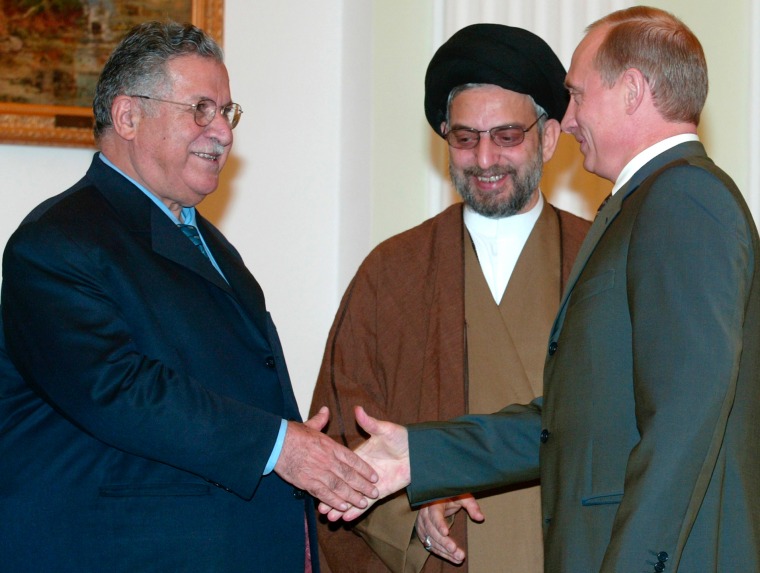Russia is ready to write off more than half of the $8 billion that Baghdad owes Moscow, its largest creditor, President Vladimir Putin told a visiting Iraqi delegation on Monday.
At a Kremlin meeting, Putin also told the delegation that Russian companies are ready to invest up to $4 billion in Iraq as Russia looked to revive oil and other contracts ruptured or left unimplemented in the last years of Saddam Hussein’s regime.
“We have always developed ties with your nation,” Putin said. “We strongly hope that Russia will have good relations with the new leadership of Iraq.”
Samir Shaker Mahmoud, a member of the Iraqi Governing Council, said Putin told the delegation that Russia was ready to write off 65 percent of Iraq’s debt.
The debt is part of the approximately $41 billion owed by Iraq to the so-called Paris Club of creditor nations; Iraq’s overall debt is about $120 billion.
“Sometime in 2004 the Paris Club will meet and Iraq will be discussed. At that point, every member will have its position clear” on how much of the debt to write off, Mahmoud said.
Feelers to Baker
Last week, Putin had told James A. Baker III, the U.S. envoy on Iraqi debt, that Moscow was prepared to begin negotiations on debt forgiveness but only “taking into account the economic interests of Russia and Russian companies in Iraq.”
Another council member, Jalal Talabani, told a news conference that Putin held out the prospect of “further help and support if there are Russian contracts.” He did not specify what that help might be.
The ousting of Saddam Hussein’s regime by the U.S.-led military invasion brought an end to the U.N.-sanctioned oil-for-food program, which had been a bonanza for Russian companies. Under the program, Russian companies got preferential terms for contracts to supply products ranging from rice to refinery equipment and received Iraqi oil, which was then resold to others.
Russia’s eagerness to resume business in Iraq is whetted by its being excluded from contracts for Iraqi reconstruction. The United States decided to bar countries that opposed the war from taking part in the reconstruction efforts, with a price tag of more than $18 billion.
Abdel-Aziz al-Hakim, who headed the delegation and is the current president of the Iraqi Governing Council, said the Iraqis are interested in developing relations with Russia, and added that Russian companies could “compete successfully” on the Iraqi market.
More talks planned
Russia’s Energy Minister Igor Yusufov told reporters after the Kremlin talks that the Iraqi delegation had proposed “resuming talks between experts on Russian contracts” and officials from both sides will soon sit down for talks.
Russia is also concerned about the status of a 1997 contract under which a consortium of several Russian companies was to develop Iraq’s West Qurna-2 oil field. That project never got under way because of U.N. sanctions against Iraq.
Al-Hakim met Monday with the head of Russian oil company Lukoil, the major partner in the $6 billion project, and told the news conference later that “in principle we’re not opposed” to activating the contract.
Saddam had severed the West Qurna agreement last year, saying Lukoil had not fulfilled the terms of the contract.
Russia set to forgive much of Iraq's debt
Russia is ready to write off a significant part -- perhaps as much as 65 percent -- of the $8 billion that Baghdad owes Moscow, President Vladimir Putin told a visiting Iraqi delegation on Monday.

/ Source: The Associated Press